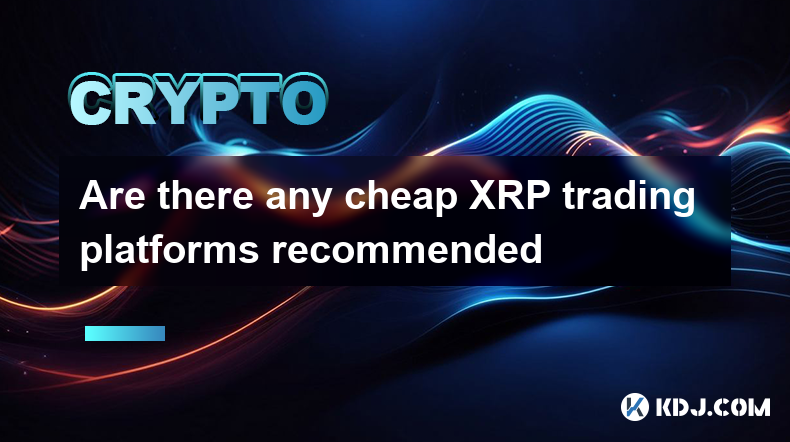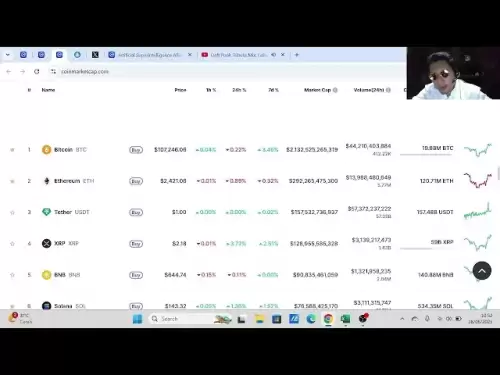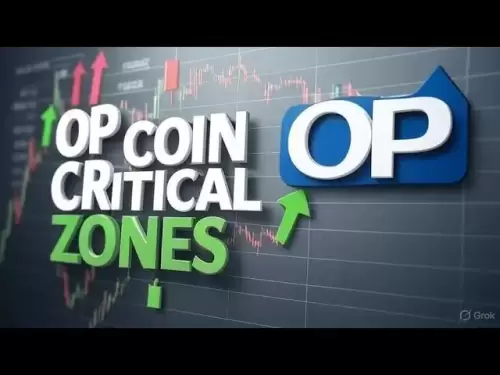-
 Bitcoin
Bitcoin $107,352.1067
0.28% -
 Ethereum
Ethereum $2,429.3531
-0.90% -
 Tether USDt
Tether USDt $1.0001
-0.02% -
 XRP
XRP $2.1894
4.62% -
 BNB
BNB $646.7968
0.36% -
 Solana
Solana $147.4290
4.03% -
 USDC
USDC $0.9998
-0.02% -
 TRON
TRON $0.2756
1.52% -
 Dogecoin
Dogecoin $0.1630
1.14% -
 Cardano
Cardano $0.5612
1.18% -
 Hyperliquid
Hyperliquid $37.0580
-0.05% -
 Bitcoin Cash
Bitcoin Cash $496.9410
-0.09% -
 Sui
Sui $2.7318
3.19% -
 Chainlink
Chainlink $13.1503
0.58% -
 UNUS SED LEO
UNUS SED LEO $9.0766
0.55% -
 Avalanche
Avalanche $17.7220
1.46% -
 Stellar
Stellar $0.2380
1.52% -
 Toncoin
Toncoin $2.8439
0.38% -
 Shiba Inu
Shiba Inu $0.0...01143
1.84% -
 Litecoin
Litecoin $85.8053
1.47% -
 Hedera
Hedera $0.1483
2.70% -
 Monero
Monero $314.3240
2.12% -
 Bitget Token
Bitget Token $4.6725
0.77% -
 Dai
Dai $1.0000
0.00% -
 Polkadot
Polkadot $3.3555
1.28% -
 Ethena USDe
Ethena USDe $1.0001
0.02% -
 Uniswap
Uniswap $7.0890
2.64% -
 Pi
Pi $0.5355
-3.40% -
 Pepe
Pepe $0.0...09393
1.06% -
 Aave
Aave $256.8136
-1.90%
Are there any cheap XRP trading platforms recommended
Trading XRP cost-effectively involves considering trading, deposit/withdrawal, and account fees across platforms like Binance, Kraken, and Coinbase, tailored to your trading volume and payment methods.
Mar 31, 2025 at 12:49 am

?
Finding a cost-effective platform to trade XRP, like any cryptocurrency, requires careful consideration. The "cheapness" isn't solely determined by trading fees, but also by deposit/withdrawal fees, account maintenance fees, and the overall user experience. No single platform is universally "cheapest" as costs vary depending on your trading volume and chosen payment methods. Let's explore some factors and platforms to consider.
Understanding XRP Trading Costs
Several factors contribute to the overall cost of trading XRP. Trading fees are the most obvious, usually expressed as a percentage of the trade value or a fixed fee per trade. Deposit and withdrawal fees can vary significantly depending on the payment method (e.g., bank transfer, credit card, crypto deposit). Some platforms charge account maintenance fees, although this is less common for cryptocurrency exchanges. Finally, the spread, the difference between the bid and ask price, indirectly impacts your costs. A wider spread means you'll pay more.
Exploring Potential Platforms
Several platforms offer XRP trading with varying fee structures. It's crucial to research each platform thoroughly before committing your funds. Remember that fees and services can change, so always check the most up-to-date information on the exchange's website.
Binance: Binance is known for its generally low trading fees, especially for high-volume traders. However, their fee structure can be complex, with different tiers based on your trading volume and BNB holdings. Deposit and withdrawal fees also vary depending on the method.
Kraken: Kraken is a well-established exchange with a reputation for security and a relatively transparent fee structure. They offer a variety of trading pairs and generally competitive fees. However, their fees might be slightly higher than Binance for smaller trades.
KuCoin: KuCoin offers a wide range of cryptocurrencies, including XRP, and is often praised for its low trading fees. Similar to Binance, their fee structure is tiered, rewarding higher trading volumes. Examine their deposit and withdrawal fees carefully before using the platform.
Coinbase: Coinbase is a user-friendly platform, particularly for beginners. While their fees are generally higher than those of the exchanges mentioned above, their ease of use and robust security features might outweigh the cost for some users. They prioritize a simplified user experience, often at the cost of lower fees.
Crypto.com: Crypto.com provides a variety of services, including cryptocurrency trading. Their fee structure is competitive, particularly for users who stake their CRO token. They offer different fee tiers based on your CRO stake, making it beneficial for long-term holders of their native token.
Minimizing Trading Costs
Regardless of the platform you choose, you can minimize your trading costs by employing several strategies.
- Trade in larger volumes: Many platforms offer tiered fee structures, rewarding higher trading volumes with lower fees.
- Use limit orders: Limit orders allow you to buy or sell at a specific price, helping you avoid paying more than necessary.
- Take advantage of promotions: Some platforms periodically offer promotional discounts on trading fees. Keep an eye out for these opportunities.
- Utilize less expensive payment methods: Bank transfers are usually cheaper than credit card deposits. Crypto deposits can also be significantly cheaper than fiat deposits.
- Compare fees across platforms: Before committing to a platform, compare the fees charged by several different exchanges to find the most cost-effective option for your trading style and volume.
Frequently Asked Questions
Q: Are there any completely free XRP trading platforms?
A: No, there aren't any completely free XRP trading platforms. All platforms need to cover operational costs, which are usually covered through trading fees, deposit/withdrawal fees, or other charges.
Q: How do I choose the best platform for my needs?
A: Consider your trading volume, preferred payment methods, and technical expertise. High-volume traders might benefit from platforms with tiered fee structures, while beginners might prefer user-friendly platforms with slightly higher fees.
Q: What are the risks associated with trading XRP on cheaper platforms?
A: Cheaper platforms may sometimes compromise on security or customer support. Thoroughly research the platform's reputation and security measures before depositing funds.
Q: Are there any hidden fees I should be aware of?
A: Always review the platform's fee schedule carefully. Hidden fees can include inactivity fees, withdrawal fees for specific cryptocurrencies, and potentially even fees for using certain payment methods.
Q: Can I trade XRP on decentralized exchanges (DEXs)?
A: Yes, you can trade XRP on DEXs. However, DEXs often involve higher gas fees and can be more technically challenging to use than centralized exchanges. Furthermore, DEXs may have less liquidity for XRP compared to centralized exchanges.
Disclaimer:info@kdj.com
The information provided is not trading advice. kdj.com does not assume any responsibility for any investments made based on the information provided in this article. Cryptocurrencies are highly volatile and it is highly recommended that you invest with caution after thorough research!
If you believe that the content used on this website infringes your copyright, please contact us immediately (info@kdj.com) and we will delete it promptly.
- Across Crypto Project Faces Heat: Secret $23M Transfer Sparks Governance Debate
- 2025-06-28 16:30:13
- Trump Coin's Wild Ride: Liquidity Drain, Exchange Deposits, and What It Means for Binance & OKX
- 2025-06-28 16:50:13
- Solana, XRP, and Spot ETFs: A New York Minute on Crypto's Shifting Sands
- 2025-06-28 17:10:13
- Trump, Memecoin Mania, and Whale Watching: A New York Minute in Crypto
- 2025-06-28 16:30:13
- Gemini, Tokenized Stocks, and Europe: A New Era for Investment?
- 2025-06-28 17:10:13
- Shiba Inu, Lending Coins, and Early Holders: A New Frontier
- 2025-06-28 16:51:59
Related knowledge

How to customize USDT TRC20 mining fees? Flexible adjustment tutorial
Jun 13,2025 at 01:42am
Understanding USDT TRC20 Mining FeesMining fees on the TRON (TRC20) network are essential for processing transactions. Unlike Bitcoin or Ethereum, where miners directly validate transactions, TRON uses a delegated proof-of-stake (DPoS) mechanism. However, users still need to pay bandwidth and energy fees, which are collectively referred to as 'mining fe...

USDT TRC20 transaction is stuck? Solution summary
Jun 14,2025 at 11:15pm
Understanding USDT TRC20 TransactionsWhen users mention that a USDT TRC20 transaction is stuck, they typically refer to a situation where the transfer of Tether (USDT) on the TRON blockchain has not been confirmed for an extended period. This issue may arise due to various reasons such as network congestion, insufficient transaction fees, or wallet-rela...

How to cancel USDT TRC20 unconfirmed transactions? Operation guide
Jun 13,2025 at 11:01pm
Understanding USDT TRC20 Unconfirmed TransactionsWhen dealing with USDT TRC20 transactions, it’s crucial to understand what an unconfirmed transaction means. An unconfirmed transaction is one that has been broadcasted to the blockchain network but hasn’t yet been included in a block. This typically occurs due to low transaction fees or network congestio...

How to check USDT TRC20 balance? Introduction to multiple query methods
Jun 21,2025 at 02:42am
Understanding USDT TRC20 and Its ImportanceUSDT (Tether) is one of the most widely used stablecoins in the cryptocurrency market. It exists on multiple blockchain networks, including TRC20, which operates on the Tron (TRX) network. Checking your USDT TRC20 balance accurately is crucial for users who hold or transact with this asset. Whether you're sendi...

What to do if USDT TRC20 transfers are congested? Speed up trading skills
Jun 13,2025 at 09:56am
Understanding USDT TRC20 Transfer CongestionWhen transferring USDT TRC20, users may occasionally experience delays or congestion. This typically occurs due to network overload on the TRON blockchain, which hosts the TRC20 version of Tether. Unlike the ERC20 variant (which runs on Ethereum), TRC20 transactions are generally faster and cheaper, but during...

The relationship between USDT TRC20 and TRON chain: technical background analysis
Jun 12,2025 at 01:28pm
What is USDT TRC20?USDT TRC20 refers to the Tether (USDT) token issued on the TRON blockchain using the TRC-20 standard. Unlike the more commonly known ERC-20 version of USDT (which runs on Ethereum), the TRC-20 variant leverages the TRON network's infrastructure for faster and cheaper transactions. The emergence of this version came as part of Tether’s...

How to customize USDT TRC20 mining fees? Flexible adjustment tutorial
Jun 13,2025 at 01:42am
Understanding USDT TRC20 Mining FeesMining fees on the TRON (TRC20) network are essential for processing transactions. Unlike Bitcoin or Ethereum, where miners directly validate transactions, TRON uses a delegated proof-of-stake (DPoS) mechanism. However, users still need to pay bandwidth and energy fees, which are collectively referred to as 'mining fe...

USDT TRC20 transaction is stuck? Solution summary
Jun 14,2025 at 11:15pm
Understanding USDT TRC20 TransactionsWhen users mention that a USDT TRC20 transaction is stuck, they typically refer to a situation where the transfer of Tether (USDT) on the TRON blockchain has not been confirmed for an extended period. This issue may arise due to various reasons such as network congestion, insufficient transaction fees, or wallet-rela...

How to cancel USDT TRC20 unconfirmed transactions? Operation guide
Jun 13,2025 at 11:01pm
Understanding USDT TRC20 Unconfirmed TransactionsWhen dealing with USDT TRC20 transactions, it’s crucial to understand what an unconfirmed transaction means. An unconfirmed transaction is one that has been broadcasted to the blockchain network but hasn’t yet been included in a block. This typically occurs due to low transaction fees or network congestio...

How to check USDT TRC20 balance? Introduction to multiple query methods
Jun 21,2025 at 02:42am
Understanding USDT TRC20 and Its ImportanceUSDT (Tether) is one of the most widely used stablecoins in the cryptocurrency market. It exists on multiple blockchain networks, including TRC20, which operates on the Tron (TRX) network. Checking your USDT TRC20 balance accurately is crucial for users who hold or transact with this asset. Whether you're sendi...

What to do if USDT TRC20 transfers are congested? Speed up trading skills
Jun 13,2025 at 09:56am
Understanding USDT TRC20 Transfer CongestionWhen transferring USDT TRC20, users may occasionally experience delays or congestion. This typically occurs due to network overload on the TRON blockchain, which hosts the TRC20 version of Tether. Unlike the ERC20 variant (which runs on Ethereum), TRC20 transactions are generally faster and cheaper, but during...

The relationship between USDT TRC20 and TRON chain: technical background analysis
Jun 12,2025 at 01:28pm
What is USDT TRC20?USDT TRC20 refers to the Tether (USDT) token issued on the TRON blockchain using the TRC-20 standard. Unlike the more commonly known ERC-20 version of USDT (which runs on Ethereum), the TRC-20 variant leverages the TRON network's infrastructure for faster and cheaper transactions. The emergence of this version came as part of Tether’s...
See all articles
























































































